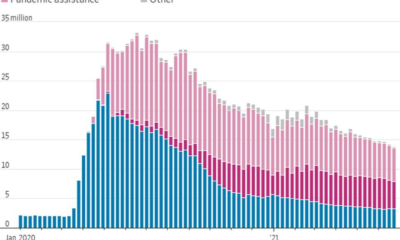Real Estate
Parents warned as norovirus cases soar in schools and nurseries

Cases of the notifiable “winter vomiting bug” have prompted warnings from Public Health Wales and headteachers.
Parents are being told to look out for signs of norovirus in their children as cases of the winter vomiting bug soar in schools and nurseries. Public Health Wales said the virus is extremely infectious and cases have been rising.
Norovirus, known as the winter vomiting bug has seen lots of children and staff off school as cases rise. Parents are being told not to send children back in until they are fully better.
Dr Christopher Williams, Consultant Epidemiologist for Public Health Wales, said: “Incidents involving diarrhoea and vomiting have increased in recent weeks in Wales, particularly in schools and nurseries. These are often caused by norovirus, a self-limiting but unpleasant infection. Laboratory reports are also at seasonally high levels.”
Read more: “Schools are at breaking point,” says former teacher who left to run children’s wellbeing education sessions.
Dr Williams added: “Norovirus infections are usually common at this time of year can spread easily, especially in settings such as schools, nurseries, care homes and healthcare facilities.
“Anyone with symptoms of diarrhoea and vomiting should stay at home and not attend work, school or nursery settings until 48 hours after symptoms have resolved.
“It is important to avoid spreading infection to other people at home, and people who are unwell should wash their hands thoroughly with soap and warm water after using the toilet and before preparing food, and should not share towels with other people.”
Schools in Cardiff are among those affected. A Cardiff Council spokesperson said: “We are currently seeing a significant number of sickness and diarrhoea cases in the community, including Norovirus, a common stomach bug that usually goes away after around two days.
“Sickness and diarrhoea bugs are very infectious, which can often mean an increase in cases in community settings, including schools, nurseries and residential homes. When that happens, those settings are supported by the Council’s Environmental Health Team to put measures in place which will mitigate against the risk of further spread.
“If a child is symptomatic, the advice to parents is to not send them to school, and to keep them at home until they have had no sickness and diarrhoea for at least 48 hours.”
Pentyrch Primary headteacher Amanda Reynolds has written to parents urging them to be aware of the virus, which is a notifiable illness, and to take precautions to stop the spread.
Her letter added: “A number of children within our school are currently absent due to suffering with vomiting and/or diarrhoea. This illness is likely to be caused by a virus known as Norovirus. Norovirus is also known as ‘Winter Vomiting Disease’ because it is common during the colder months of the year.”
She said the following precautions will reduce the spread of this illness in school.
If your child vomits or has diarrhoea or is feeling genuinely sick do not send them to school.
They should then not return to school until 48 hours (2 days) after their last symptom, for example if the last time they vomited was Tuesday 8.00pm they can come back to school on Friday. This is because you can still excrete and pass on the virus to other people even though you may feel better.
Her letter added: “While this illness is in our community, encourage your child to wash their hands regularly with liquid soap and warm water and dry them thoroughly. This is very important after they have used the toilet and before eating food.
“Please be assured we are in constant liaison with the relevant authorities (Local Authority Health and Safety Team and the Health, Safety and Communicable Disease Team) to seek appropriate advice.”
Real Estate
Central banks end crisis-fighting measure as bank tumult recedes

Last month, the collapse of Silicon Valley Bank, the second-largest bank failure in US history, unleashed broader panic and raised fears the global financial system would seize up. Now, central banks are signaling that their immediate concerns have eased.
The Bank of England, the Bank of Japan, the European Central Bank and the Swiss National Bank said Tuesday that they would end daily measures to boost the flow of US dollars to lenders around the world. They cited “improvements in US dollar funding conditions” and “low demand” at recent operations aimed at providing liquidity.
Starting May 1, those operations will once again be held weekly, a decision made in consultation with the US Federal Reserve, the primary source of dollars. The frequency could increase again if needed, the four central banks said.
“These central banks stand ready to readjust the provision of US dollar liquidity as warranted by market conditions,” they said in their statements.
Policymakers sprung into action in March after the collapse of Silicon Valley Bank and Signature Bank in the United States sparked an acute bout of turmoil in the global banking sector. The tumult also nearly took down Credit Suisse (CS), a globally important but troubled bank, forcing Swiss authorities to arrange an emergency sale to rival UBS (UBS).
Hours after the Credit Suisse takeover was announced, the Fed said it would work with central banks in the United Kingdom, Japan, Canada, Switzerland and the European Union to make sure lenders there had access to the dollar liquidity they needed.
That meant making greater use of dollar swap lines, or agreements between the Fed and other central banks to provide dollars in exchange for, say, euros or yen.
Swap lines are a key instrument in central banks’ toolbox aimed at preserving financial stability and keeping credit flowing to households and businesses.
Real Estate
Fukushima’s fishing industry survived a nuclear disaster. 12 years on, it fears Tokyo’s next move may finish it off

It is still morning when Kinzaburo Shiga, 77, returns to Onahama port after catching a trawler full of fish off Japan’s eastern coast.
But the third-generation fisherman won’t head straight to market. First, he’ll test his catch for radiation.
It’s a ritual he’s repeated for more than a decade since a devastating earthquake and tsunami triggered a nuclear meltdown at the Fukushima Daiichi power plant in 2011, spewing deadly radioactive particles into the surrounding area.
Radiation from the damaged nuclear plant leaked into the sea, prompting authorities to suspend fishing operations off the coast of three prefectures that had previously provided Japan with half of its catch.
That ban lasted over a year, and even after it was lifted, Fukushima-based fishermen like Shiga were for years mostly limited to collecting samples for radioactivity tests on behalf of the state-owned electricity firm Tokyo Electric Power Company, or TEPCO, rather than taking their catches to market.
Ocean currents have since dispersed the contaminated water enough that radioactive cesium is nearly undetectable in fish from Fukushima prefecture. Japan lifted its last remaining restrictions on fish from the area in 2021, and most countries have eased import restrictions.
Shiga and others in the industry thought they’d put the nightmare of the past years behind them.
So when Japan followed through on plans to gradually release more than 1 million metric tons of filtered wastewater into the Pacific Ocean from the summer of 2023 – an action the government says is necessary to decommission the plant safely – the industry reeled.
The Japanese government and the International Atomic Energy Agency (IAEA), a United Nations body promoting the peaceful use of nuclear energy, say the controlled release, which is expected to take decades, will meet international safety regulations and not harm the environment, as the water will be treated to remove radioactive elements – with the exception of tritium – and diluted more than 100 times.
But with the deadline for the planned water release looming this summer, Fukushima’s fishermen fear that – whether the release is safe or not – the move will undermine consumer confidence in their catches and once again threaten the way of life they have fought so hard to recover.
Real Estate
Video shows US police at wrong house before shooting homeowner

Robert Dotson, 52, was killed by police on April 5 in New Mexico after officers responding to a domestic violence report arrived at the wrong house.
New Mexico police officers realised they were at the wrong address just moments before the front door opened and they fatally shot the armed homeowner, then exchanged gunfire with his wife, according to newly released body camera video of the April 5 shooting.
Robert Dotson, 52, was killed in Farmington, a city of 47,000 people in the southwestern US state, after officers on their way to a domestic violence call went to the wrong house.
The Farmington Police Department released several videos on Friday, including footage captured by body cameras worn by the three officers who fired their weapons.
“All of us – the men and women of the Farmington Police Department – recognise the severity of this incident,” Police Chief Steven Hebbe said in a statement.
“Once again, we wish to express our condolences to the Dotson family, and as your chief of police, I wish to convey how very sorry I am that this tragedy occurred,” Hebbe said.
-

 Business2 years ago
Business2 years agoHyundai Leads Industry in U.S. News & World Report 2023 Best Cars for the Money Awards
-

 Innovation2 years ago
Innovation2 years agoJay-S ventures into the urban genre with “Bailar en la Playa” his latest production
-

 Business2 years ago
Business2 years agoThree Questions Small Business Owners Should Ask In Creating A Workplace Culture – Forbes
-

 Business2 years ago
Business2 years agoA Fintech Makes It Easy For Small Businesses To Offer 401(k) Retirement Benefits – Forbes
-

 Business2 years ago
Business2 years agoBritain’s Small Businesses See Better Times Ahead But Is Their Optimism Justified? – Forbes
-

 Money2 years ago
Money2 years agoCharlie Crist leads Democratic gubernatorial field again in money chase – Florida Politics
-

 Money2 years ago
Money2 years agoTesting New Tools for Horizon Worlds Creators To Earn Money
-

 Business2 years ago
Business2 years agoSmall Business Labor Shortage – Forbes
